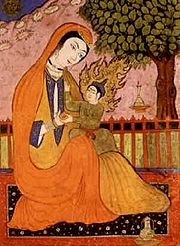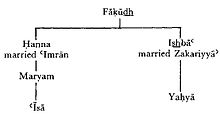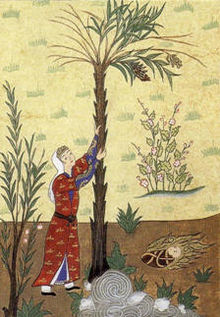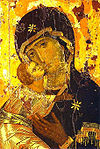- Islamic views of Mary
-
This article is about Mary in Islam . For other uses, see Virgin Mary.
Saint Mary the Holy Virgin 
Mary and Jesus in a Persian miniatureVirgin, The Purified, The Exalted, Mother of Jesus, Keeper of Chastity, Mystic, Female Exemplar, Maternal Heroine, Queen of the Saints
Sai'ma, Mustafia, Rāki’ah, Sājidah, Qānitah, Siddiqah, TāhirahBorn c. 20 B.C.E.
JerusalemDied c. 100 - 120 C.E.
JerusalemHonored in All Islam
All ChristianityMajor shrine Mary's Tomb, Kidron Valley Influenced All Muslim and Christian women. This article is part of the series: Islam 
Mary (مريم Maryam in Arabic), the mother of Jesus, is considered one of the most righteous women in the Islamic tradition. She is mentioned more in the Qur'an[1] than in the entire New Testament and is also the only woman mentioned by name in the Qur'an.[2] According to the Qur'an, Jesus was born miraculously by the will of God without a father. His mother is regarded as a chaste and virtuous woman and is said to have been a virgin. The Qur'an states clearly that Jesus was the result of a virgin birth, but that neither Mary nor her son were divine. In the Qur'an, no other woman is given more attention than Mary and the Qur'an states that Mary was chosen above all women:
"And when the angels said: O Mary! Lo! God hath chosen thee and made thee pure, and hath preferred thee above (all) the women of creation."[3]
The nineteenth chapter of the Qur'an is named after her and is, to some extent, about her life. Of the Qur'an's 114 suras, she is among only eight people who have a chapter named after them. Mary is specifically mentioned in the Qur'an, alongside Asiya, as an exemplar for all righteous women.[4] Mary plays an important role in Islamic culture and religious tradition, and verses from the Qur'an relating to Mary are frequently inscribed on the mihrab of various mosques, including in the Hagia Sophia.[5]
Contents
Family
The Qur'an refers to Mary as being from the "house of Amram", which is a reference to Amram, the father of Moses and Aaron, through whom Mary descended. Mary is further called the "daughter of Amram", which has again been interpreted to refer to her ancestor rather than her actual father, who is unnamed in the Qur'an, but to whom Christian tradition applies the name Joachim. Muslim scholars and commentators have seen the Qur'an's statement of Mary being a "daughter of Amram" as similar to the description of Elizabeth in the Gospel of Luke as being one of the "daughters of Aaron"; they interpret both of these phrases as referring to ancestral fathers, rather than literal fathers. Take note, however, that the Gospel of Luke only says Mary and Elizabeth are relatives. There is no phrase "the daughter of Aaron." (Only Luke 1 mentions Elizabeth.)
Mary's actual father is also given the name Amram in Muslim tradition, though this Amram must not be confused with the father of Moses and Aaron and is actually the equivalent of Joachim. He is also respected by Muslims as being one of the righteous men present in Jerusalem at the time. Mary's mother, meanwhile, is given the name Anne (Hannah in Arabic) in Muslim literature and is revered by Muslims as being, like her daughter, one of the most righteous women ever.
Mary in the Qur'an
Mary is mentioned frequently in the Qur'an, and her narrative occurs consistently from the earliest chapters, revealed in Mecca, to the latest verses, revealed in Medina.
Birth
The birth of Mary is narrated in the Qur'an with references to her father as well as Saint Anne. Mary's father is called Amram in tradition and is the equivalent of Joachim in Christian tradition. Muslim literature narrates that Amram (Imran in Arabic) and Anne (Hannah in Arabic) were old and childless and that, one day, the sight of a bird in a tree feeding her young aroused Anne's desire for a child. She prayed to Allah to fulfill her desire[6] and vowed, if her prayer was accepted, that her child would be dedicated to the service of Allah. She prayed for her child to remain protected from Satan and Muslim tradition records a hadith, which states that the only children born without the "touch of Satan," were Mary and Jesus.[7]
Early years
The Qur'an narrates that Mary grew up in the temple of the prayer, and had a special place in the temple of her own. She was placed under the care of the prophet Zechariah. The Muslim narrative makes it clear that lots were cast[8] as to who should be the guardian of Mary and the outcome was that she should be placed under Zechariah's care. As often as Zechariah entered Mary's prayer chamber, he found her provided with food[9] and he would ask her where she received it from, to which she would reply that Allah provides to whom He wills. Scholars have debated as to whether this refers to miraculous food that Mary received from Allah or whether it was normal food. Those in favor of the former view state that it had to be miraculous food, as Zechariah being a prophet, would have known that Allah is the provider of all sustenance and thus would not have questioned Mary, if it was normal food.
Annunciation to Mary
The virgin birth of Jesus is supremely important in Islam, as one of the most important miracles of Allah. The first explicit mention of an annunciation foreshadowing the birth of Jesus is in XIX: 20, where Mary asks Gabriel how she will be able to conceive, when no man has touched her. Gabriel's reply assures Mary that for Allah all things are easy and that Jesus's virgin birth will be a sign for mankind. The birth is later referred in LXVI: 12, where the Qur'an states that Mary remained "pure", while Allah allowed a life to shape itself in Mary's womb. A third mention of the annunciation is in III: 37-38, where Mary is also given the glad tidings that she has been chosen above all the women of creation. Commentators on the Qur'an remark on the last verse that Mary was as close to a perfect woman as there could be, and she was devoid of almost all failings.[10] Although Islam honors numerous women, including Khadija and Fatimah, many commentators[11] followed this verse in the absolute sense, and agreed that Mary was the greatest woman of all time. Other commentators, however, while maintaining that Mary was the "queen of the saints", interpreted this verse to mean that Mary was the greatest woman of that time and that Fatimah and Khadija were equally great.[12] According to exegesis and literature, Gabriel appeared to Mary, who was still young in age, in the form of a well-made man with a "shining face" and announced to her the birth of Jesus. After her immediate astonishment, she was reassured by the angel's answer that Allah has the power to do anything.[13]
Virgin birth of Jesus
The Qur'an narrates the virgin birth of Jesus numerous times. In XIX: 17-21, the annunciation is given, followed by the virgin birth, which exegesis relates took place soon after the annunciation. The Qur'an's narrative of the virgin birth is somewhat different from that in the New Testament. The Qur'an states that Mary was in the midst of the desert, when the pains of childbirth came upon her, as she was near a palm tree. Mary cried in pain and held onto the palm, at which point a voice came from "beneath her", understood by some to refer to Jesus, who was yet in her womb, which said "Be not grieved; Allah has provided a rivulet under thee; and shake the trunk of the palm and it shall let ripe dates fall upon thee, ready gathered. And eat and drink and calm thy mind". The Qur'an goes onto describe that Mary vowed not to speak to any man on that day, as Allah was to make Jesus, whom Muslims believe spoke in the cradle, perform his first miracle. The Qur'an goes onto narrate that Mary then brought Jesus to the temple, where immediately she began to be taunted by all the men, excluding Zechariah, who believed in the virgin birth. The Israelites accused Mary of having touched another man whilst unmarried. It was then that the infant Jesus began to speak in the cradle, and spoke of his prophecy for the first time.
Mary in Muslim tradition
Mary is one of the most honored figures in Muslim history. Muslim women look upon her as an example and are known to visit both Muslim and Christian shrines. Muslim tradition, like Christian, honors her memory at Matariyyah near Cairo, and in Jerusalem. Muslims also visit the Bath of Mary in Jerusalem, where Muslim tradition recounts Mary once bathed, and this location was visited at times by women, who were seeking a cure for barrenness.[14] Some plants have also been named after Mary, such as Maryammiah, which, as tradition recounts, acquired its sweet scent when Mary wiped her forehead with its leaves. Another plant is Kaff Maryam, which was used by some Muslim women to help in pregnancy, and the water of this plant was given to women to drink while praying.
Islamic literature does not recount many instances from Mary's later life, and the assumption is one of the Christian events not present in any Muslim records. Nevertheless, some contemporary Muslim scholars, an example being Martin Lings, accepted the assumption as being a historical event from Mary's life.[15] One of the lesser-known events which is recorded in Muslim literature, is that of Mary visiting Rome with John and Thaddeus, the disciples of Jesus, during the reign of Nero.[16]
Arabic Titles
- Qānitah: Mary is so called in LXVI: 12. The Arabic term implies the meaning, not only of constant submission to God, but also absorption in prayer and invocation, meanings that coincides with the image of Mary spending her childhood in the temple of prayer. In this way, Mary personifies prayer and contemplation in Islam.
- Siddiqah: She who confirms the truth or She who has faith. Mary is called Siddiqah twice in the Quran (V: 73-75 LXVI: 12). The term has also been translated, She who believes sincerely completely.
- Sājidah: She who prostrates to God in worship. The Quran states: “O Mary! Worship your Lord devoutly: prostrate yourself” (Quran III: 43). While in Sujud, a Muslim is to praise God and glorify Him. In this motion, which Muslims believe to be derived from Marian nature, hands, knees and the forehead touch the ground together.
- Rāki’ah: She who bows down to God in worship. The Quran states: “O Mary! Bow down in prayer with those men, who bow down.” The command was repeated by angels only to Mary, according to the Muslim view. Ruku' in Muslim prayer during prayer has been derived from Mary’s practice.
- Tāhirah: She who was purified (Quran III: 42)
- Mustafia: She who was chosen. The Quran states: “O Mary! God has chosen you and purified you and again he has chosen you above all women of all nations of the worlds” (Quran III:42).
- Sa’imah: She who fasts. Mary is reported to fast one-half of a year in some Muslim traditions.
Many other names of Mary can be found in various other books and religious collections. In Hadith, she has been referred to by names such as Batul and Adhraa (Ascetic Virgin), and Marhumah (Enveloped in Allah's Mercy).[17]
Burial place
See also
- Maryam (sura) – for the chapter about her in the Qur'an
- Saint Mary – Iranian film depicting the life of Mary
- Roman Catholic Mariology
- Mary, the mother of Jesus – the historical and multi-denominational concept of Mary
- Blessed Virgin Mary – Christian views of Mary
- Theotokos – Eastern Orthodox views of Mary
- Mariology
References
- ^ Esposito, John. What Everyone Needs to Know About Islam. New York: University Press, 2002. P31.
- ^ "Mary" in Glasse, Cyril, Concise Encyclopedia of Islam. Stacey International, 3rd edition, 2008.
- ^ Qur'an 3:42
- ^ Qur'an 66:11-12
- ^ Dimensions of Islam, F. Schuon, Wisdom of the Virgin
- ^ Qur'an III: 31
- ^ Bukhari, Anbiya, 44; Muslim, Fada'il, trad. 146, 147
- ^ Qur'an III: 39
- ^ Qur'an III: 32
- ^ Encyclopedia of Islam, Vol. VI, pg. 629
- ^ Two such commentators were Razi and Kurtubi
- ^ R. Arnaldez, Jesus fils de Marie prophete de l'Islam, Paris 1980, 77
- ^ Encyclopedia of Islam, Vol. VI, pg. 629
- ^ T. Canaan, Muhammaden Saints and Sanctuaries in Palestine, in Journal of the Palestine Oriental Sac., iv/1-2, 1924, 1-84
- ^ Muhammad, M. Lings, pg. 101
- ^ Encyclopedia of Islam, Vol. 6, pg. 631
- ^ Khattan, Rahib; The Blessed names of Sayyidatina Maryam, pg 111
External links
- Tafsir of Surah Maryam
- Jesus and The Virgin Mary in Islam By Juan Galvan
- Mary from Sufi Islam perspective
Virgin Mary, Mother of Jesus General Mariology Roman Catholic · Anglican · Eastern Orthodox · Ecumenical (Christian) · Protestant · Lutheran · Muslim ·
Life in the Bible Annunciation · Visitation · Magnificat · Nativity · Temple Presentation of Jesus · Flight into Egypt · Finding in the Temple · Cana · Crucifixion · Deposition · Pentecost
Life in Tradition Lists Antiphons · Apparitions · Devotions · Devotions, May · Feasts · Hymns · Patronage · Shrines · Titles
Miscellaneous Titles Category · Saints Portal People in the Quran Individuals Aaron · Abel · Abraham · Abu Bakr · Abū Lahab · Adam · Amram · Anne · Asiya · Azar · Azrael · Believer of Ya-Sin · Benjamin · Cain · Caleb · David · Devil · Dhul-Kifl · Dhul-Qarnayn (Cyrus the Great, Alexander the Great) · Elijah · Elisha · Elizabeth · Eve · Ezra · Gabriel · Gog · Goliath · Haman · Harut · Hud · Idris · Isaac · Ishmael · Jacob · Jesus · Jethro · Joachim · Job · Jochebed · John the Baptist · Jonah · Joseph · Joshua · Khidr · King of Abraham's time · Korah · Lot · Luqman · Luqman's son · Maalik · Magog · Mary · Marut · Michael · Miriam · Moses · Muhammad · Noah · Pharaoh of Joseph's time · Pharaoh of the Exodus · Potiphar · Queen of Sheba · Saleh · Samiri · Samuel · Sarah · Saul · Shoaib · Solomon · Umm Jamil · Wicked man, Parable · Wondering man, Parable · Zachariah · Zaid · Zipporah · ZulaikhaGeneral groups Specific Groups Disciples of Jesus · Jinns of Solomon · Muhammad's wives · Scribes of the Quran · People of the Cave · Pharaoh's sorcerers · Twelve Tribes of IsraelCommunities ʿĀd · Companions of the Elephant · Companions of the Rass · Egypt · · Israelites · Mesopotamia · Midian · Nineveh · Sodom and Gomorrah · Thamud · People of Tubba · People of the Wood · People of Ya-Sin · Quraysh · RomansLifeforms Note: Italics denote that the name of the figure is not mentioned in the Quran, but is taken from other sources of Islamic literature. Holy Women in Islam Generations of Adam Generations of Abraham and his sons Generation of Moses Reign of Kings House of Amram Time of Muhammad Early Sufism Rabia of BasraCategories:- Muslim views of biblical figures
- Islam and women
- Mariology
Wikimedia Foundation. 2010.






